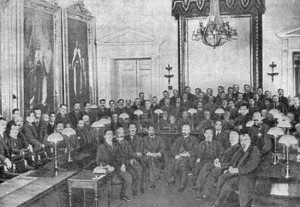March 15 & 16 1917 marked a monumental day for the Russian people, the decision to abdicate the crown was made by Tsar Nikolai the second. Nikolai handed the crown to his brother Grand Duke Mikhail Alexandrovich whom reflecting the feelings of the nation passed on all power to the Provisional Government more popularly referred to as the Duma.
In the Duma’s address to the Russian populace they start with a declaration of victory over the “dark forces of the old regime” informing the people that they now have the power to re-organize the executive power of the nation. They then transition in to a list of the new cabinet positions created and who have been appointed to them at their political alignment. These men were chosen based off of their past political and public service so the public had relations with these men so they could understand that decisions will be made by the citizens. The next step for reassuring the public were the list of principles which this new government and its members will hold themselves to. The list contains the basis for a more liberal society with items such as: forgiveness for previous victims of the law, basic freedoms, equality between all citizens, suffrage, a more public police. The most questionable law being the lack of restrictions on active duty soldiers, which most likely is in response to the war Russia was fighting at the time. The Duma concludes that this war will not delay these reforms which Russia needed.
When thinking in terms to how the Duma addresses its people is this piece successful? Could they have added anything else? What’s your interpretation for the last principle regarding active duty soldiers?

